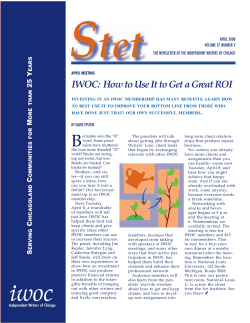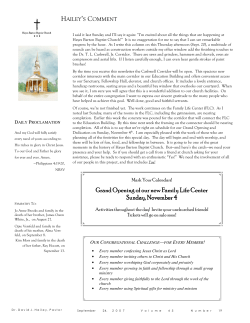
What is the Scrutiny Unit? What did the Unit do in 2008?
The Scrutiny Unit: A guide to its work What is the Scrutiny Unit? The Unit exists to provide specialist help to select committees in the scrutiny of the Government’s financial and performance reporting and of draft bills. It also carries out other work for select committees as resources permit. The Unit also supports the evidence‐ taking work of Public Bill Committees. Why is there a Scrutiny Unit? In its 1993 Commission on the legislative process, the Hansard Society wrote that “Parliament could play a greater part by pre‐legislative inquiry in the preparation of legislation”. In 1997, the newly‐established Modernisation Committee concluded that pre‐ legislative scrutiny “should lead to better legislation and less likelihood of subsequent amending legislation”. In 1999, the Procedure Committee identified a need for a specialist unit for financial scrutiny in its report on Procedure for Debate on the Government's Expenditure Plans. In 2000, the Liaison Committee recommended that the Committee Office “should establish a unit specialising in public expenditure and pre‐legislative scrutiny”. The Unit was established in November 2002. Who are the Scrutiny Unit? The Scrutiny Unit has 18 staff. They include two legal specialists, a statistician on secondment from the House of Commons Library, four financial analysts (two from the National Audit Office), an economist and a Home Affairs/Public Policy Specialist. In addition, there is a core team of the Head of Unit, two Deputy Heads (Finance and Legislation) and six support staff. The Unit also runs an internship scheme for postgraduate students. The Scrutiny Unit: A guide to its work What did the Unit do in 2008? Examples of our recent work include: • Supported pre‐legislative scrutiny by joint committees of both Houses of the draft Marine Bill and draft Constitutional Renewal Bill • Supported evidence‐taking by 12 Public Bill Committees, including those on the Banking Bill and the Counter‐Terrorism Bill • Provided analysis of Estimates and Departmental Annual Reports for all departmental select committees • Assisted the Liaison Committee in its work on improving financial scrutiny, including the Committee’s report, Recreating financial scrutiny • Supported Parliament’s engagement with HM Treasury’s “Alignment project” to simplify the Government’s financial reporting to Parliament • Supported the Justice Committee’s inquiry on Justice Reinvestment , including an online consultation • Provided briefing for the Public Administration Committee’s inquiry into Equitable Life • Provided legal assistance to the Welsh Affairs Committee in its scrutiny of draft Legislative Competence Orders in Council • Briefed and supported the Speaker’s Committee on the Electoral Commission in its review of the Commission’s 2007‐08 Estimate and Corporate Plan The Scrutiny Unit: A guide to its work What do people say about the Unit? Several select committees have commented on the assistance they have received from the Unit in the past year. For instance, the Transport Committee has noted that it received “a great deal of support from the Committee Office Scrutiny Unit, which provided us with significant help with our inquiries” and the Justice Committee refers to the “invaluable help” of the Unit and its staff. The Liaison Committee, made up of the Chairmen of all the select committees, wrote in its most recent annual report that the Unit had “added particular value to the work of committees in examining government expenditure” (The work of Committees in 2007, March 20o8). In its response to the Committee’s report, the Government noted that it “welcomes the contribution which the Scrutiny Unit has been able to make to the work of the select committees”. In its report The Fiscal Maze: Parliament, Government and Public Money (June 2006), the Hansard Society for Parliamentary Government described the establishment of the Scrutiny Unit as “a significant step forward”, and recommended that the Unit’s work “should be built upon”. In addition, the Institute for Fiscal Studies’ Green Budget 2008 cited a note produced by the Unit on public sector pensions liabilities. The Scrutiny Unit: A guide to its work The Scrutiny Unit The Scrutiny Unit: A guide to its work A guide to its work Jargon and acronyms How can I find out more? Departmental Annual Report (DAR) Departmental Reports explain to Parliament and the public how each Government department is organised, what it is spending its money on, what it is trying to achieve and how it is performing. Draft legislation The Government publishes Bills in draft when it considers that the subject matter would benefit from an extended period of consultation, before the Bill itself is introduced into Parliament. Draft legislation is often scrutinised by a Joint Committee. Supply Estimates Statements presented by the Treasury to the House of Commons in which a Government department seeks approval for its spending for the coming financial year. The estimates summarise both the resources and the cash required. Supplementary Estimates concern any additional expenditure. Estimates memorandum A note accompanying Estimates explaining the request for expenditure. Joint Committee A committee made up of MPs and Peers, usually formed for the consideration of draft legislation. Public Bill Committee (PBC) All Public Bills are subject to line‐by‐line consideration by a committee of MPs formed for that purpose. Formerly known as Standing Committees, PBCs have had, since the 2006‐07 session, the power to take oral and written evidence from witnesses. Departmental Select Committee A committee of Members of Parliament formed for the purpose of examining the expenditure, policy and administration of a government department. You can find out more about the Unit’s work on its website at: www.parliament.uk/scrutiny For an in‐depth look at how Parliament scrutinises Government expenditure, see Financial Scrutiny Uncovered, available on the Scrutiny Unit website. If you would like a hard copy, please contact Michelle Owens (owensm@parliament.uk / 020 7219 8365). If you would like to learn more about particular aspects of the Unit’s work, you could contact: Matthew Hamlyn, Head of the Unit 020 7219 8370 hamlynm@parliament.uk Emily Commander, Deputy Head (Legislation) 020 7219 8383 commandere@parliament.uk Simon Fiander, Deputy Head (Finance) 020 7219 8362 fianders@parliament.uk General inquiries: scrutiny@parliament.uk 3rd ed., November 2008
© Copyright 2025





















